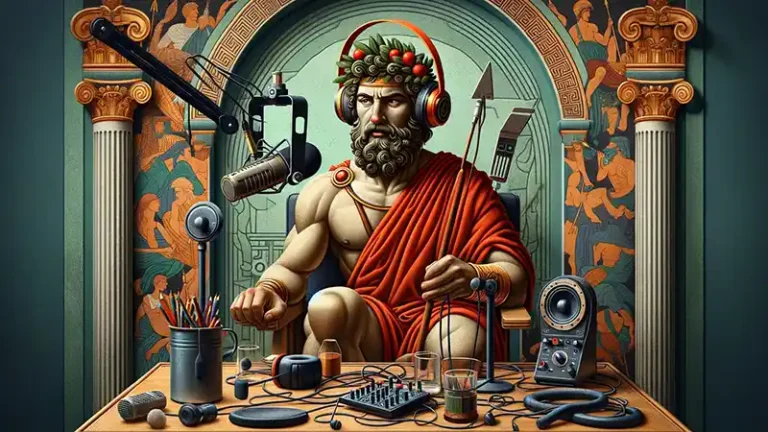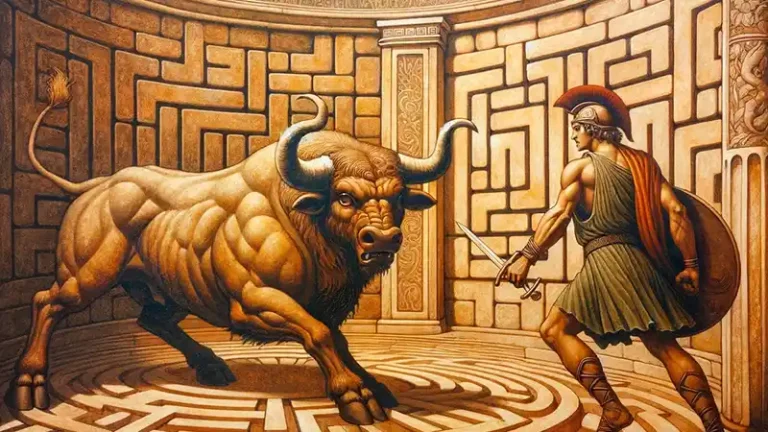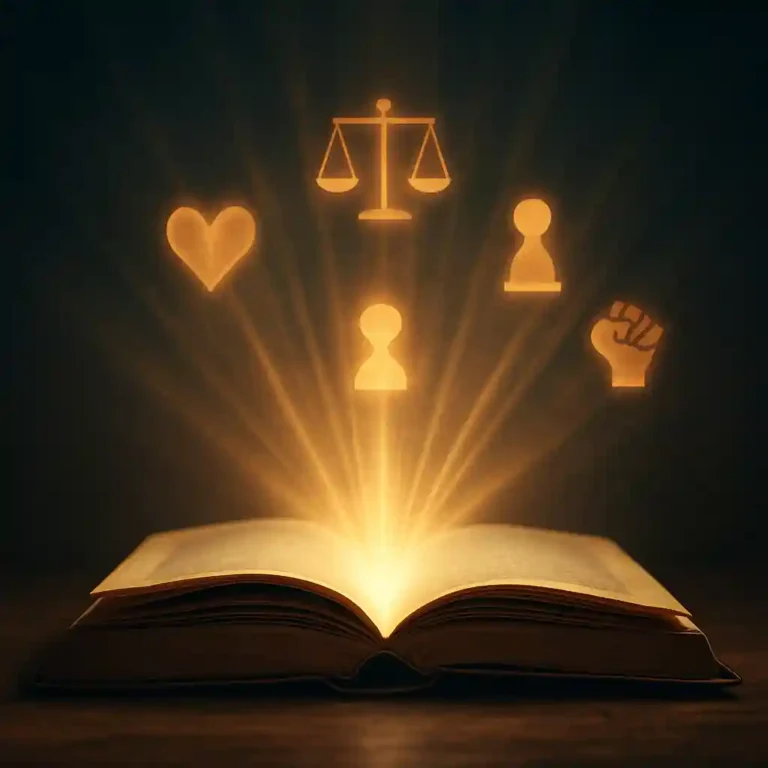Introduction to Greek Olympian Gods: Family Tree Lesson Plan
This lesson will focus on understanding the major Olympian gods and goddesses of Greek mythology. We’ll explore the fascinating family connections between deities such as Zeus, Hera, Athena, and Apollo, and how these relationships influenced the myths and stories of ancient Greece. Our goal is to not only recognize these figures but to also map out their divine family tree, giving us a clearer picture of the intricate web of kinship on Mount Olympus.
Learning Goals
- I will be able to understand why and how Greek myths were created.
- I will be able to recognize the major Greek gods like Zeus, Hera, Athena, and Apollo.
- I will be able to create and explain a simple family tree showing how these gods are related to each other.
Materials
Greek Gods Handout (PDF)
Quick Quiz Questions
- Cards, or cut-up pieces of paper for cards.
- Masking Tape
- Large Chart Paper
Process
- Have students read through the handout or go over it together.
- Show them the example of a family tree.
- Distribute the cards and ask students to label each card with the name of a God. They must also summarize key aspects of the God on the card.
- Tape each card to the chart paper to form a family tree.
Assessment
- Collect the chart paper from each group to mark and/or provide feedback.
- Go through the true or false quick quiz at the end of class.
A Family Tree
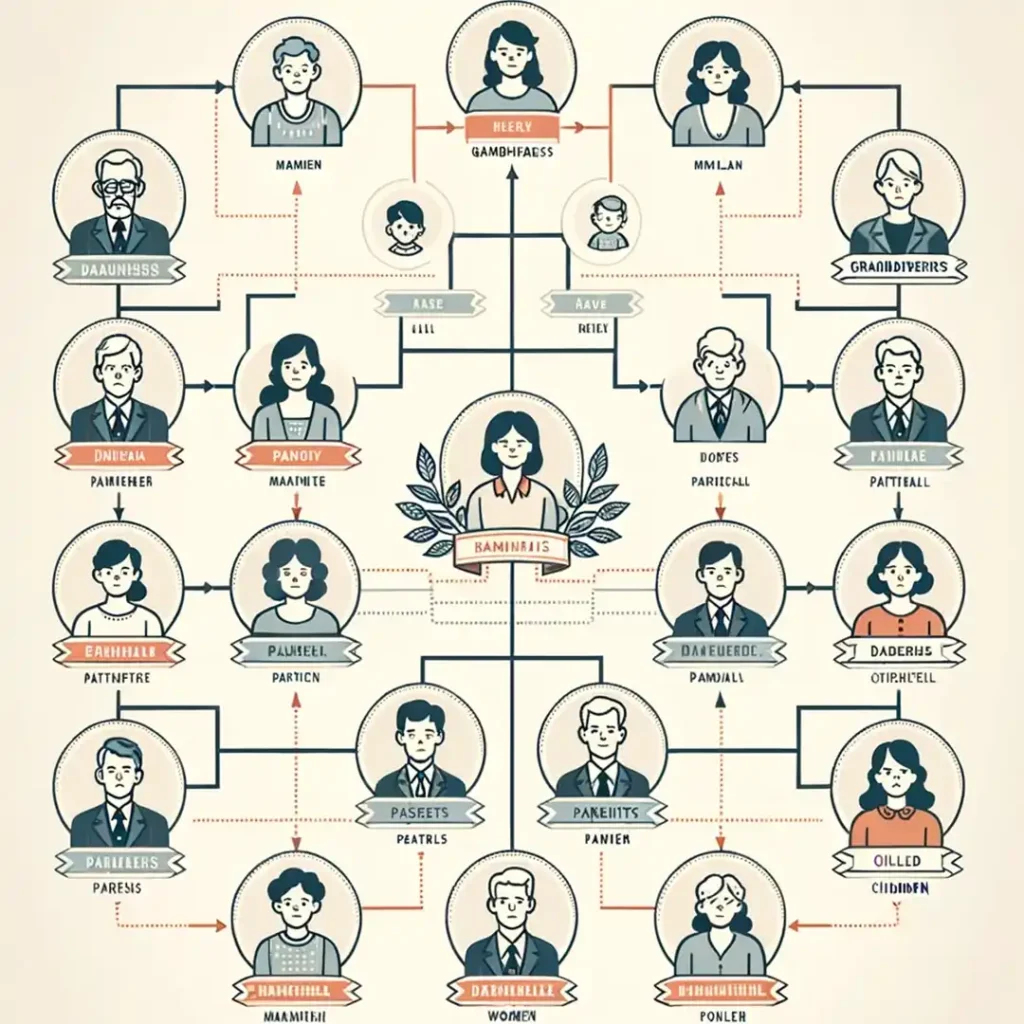
A family tree is a chart that illustrates the relationships between members of a family over several generations. It serves as a graphical representation of family history, showing the connections between relatives, including siblings, parents, grandparents, and other extended family members.
To create a family tree:
Identify the Starting Point: Decide whether to start with the earliest known ancestor at the top or start with the present generation at the bottom.
Collect Information: Assemble names, birth and death dates, marriages, and other significant life events for as many family members as possible.
Choose a Structure: Decide how to layout the tree, whether vertically with the oldest generations at the top and the youngest at the bottom, or horizontally with the oldest generations on the left.
Create Generational Levels: Organize individuals into their respective generations, with parents and children on the same level across the chart.
Connect Family Members: Use lines to connect married couples and their children. A horizontal line represents a marriage, while a vertical line leads to their offspring.
Use Symbols: Employ standard symbols like squares for males, circles for females, and equal signs for marriages, to clarify relationships at a glance.
Be Clear and Consistent: Use clear labels and maintain consistency in the formatting for names, dates, and the placement of individuals.
Remember the Titans?
Gaea: Earth Goddess, made the rest of the Titans by mating with her son, Uranus.
Uranus: Sky god, first ruler. Dethroned by Cronus.
Cronus: Fathered the first of the Olympians. Swallowed his children except for Zeus.
Prometheus: “Forethought,” Protector of man; inventor of fire.
Atlas: Punished by having to hold the world on his back.
Who Were the Olympians?
- The offspring of the Titans.
- Overthrew the Titans in a war to control the universe.
- Led by Zeus, the leader of the Olympians.
- Zeus and his brothers split territory (Zeus-earth/sky, Poseidon- the seas, Hades- the
underworld)
The Twelve Olympians
Aphrodite
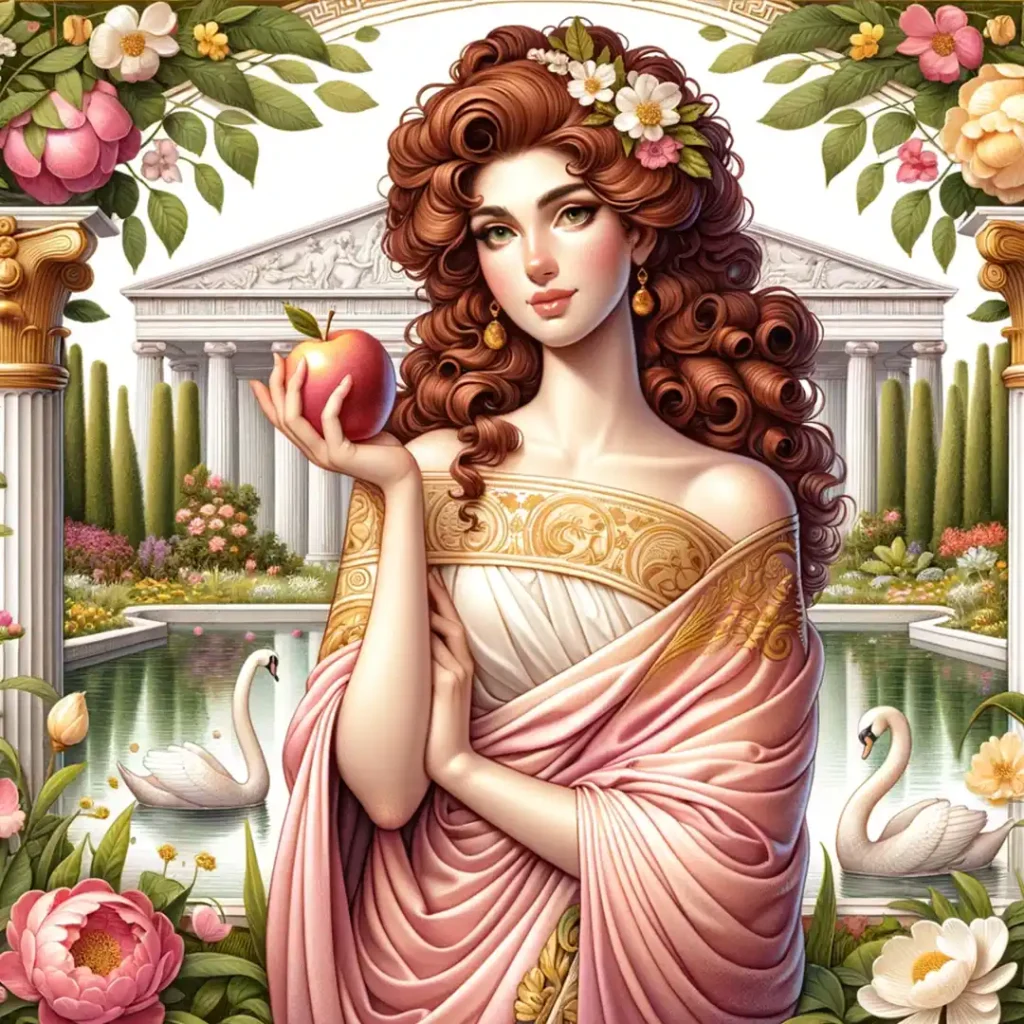
Aphrodite was the daughter of Zeus, wife to Hephaestus (but had many lovers). She is the goddess of love and beauty. Arguable that her vanity caused the Trojan War. She represents affection and can make anyone love her or fall in love. Her beauty was the source of much rivalry. Her symbols were the dove, and myrtle, a type of evergreen shrub.
Ares
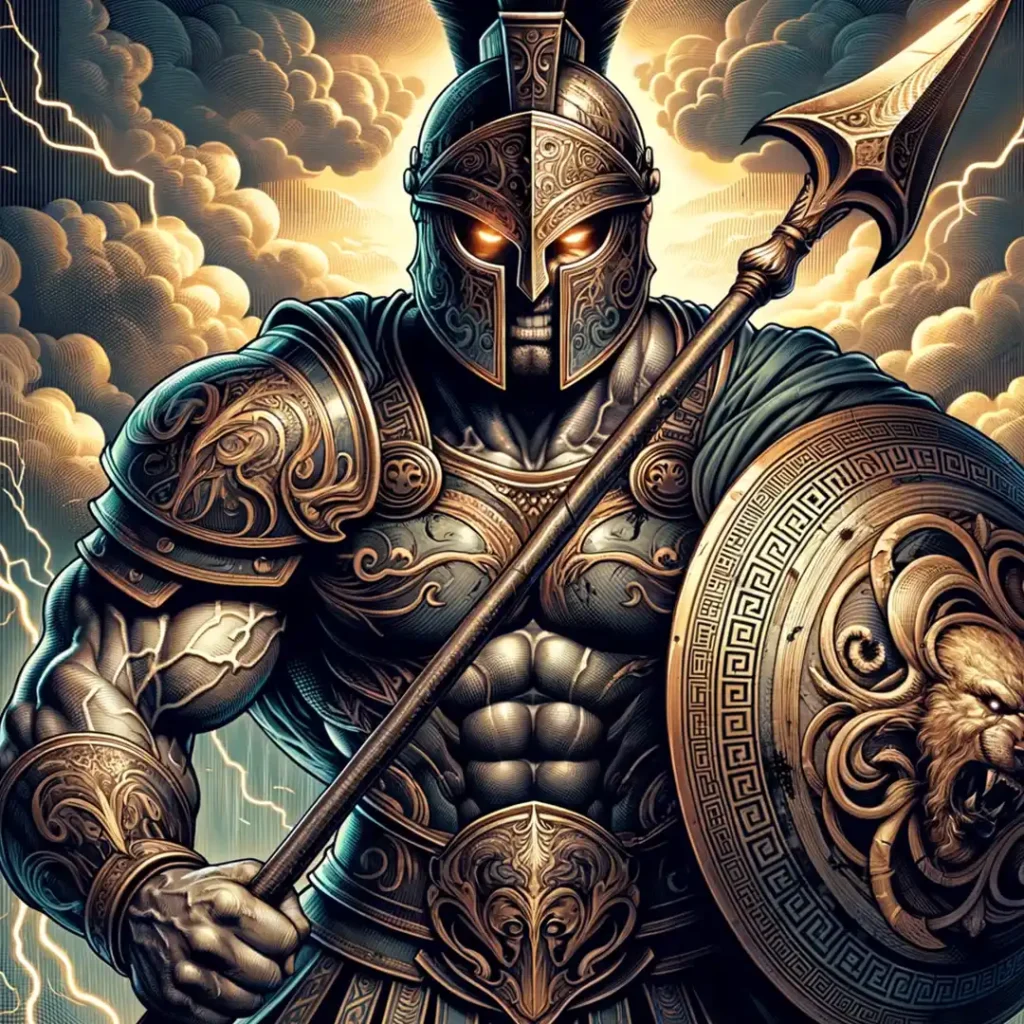
Ares was the god of war, and son of Zeus and Hera. He represented the raw violence and untamed acts that occurred in wartime, in contrast to Athena, who was a symbol of tactical strategy and military planning.
He was perhaps the most unpopular of all the Olympian gods because of his quick temper, aggressiveness, and unquenchable thirst for conflict. In the Iliad, it is mentioned that Zeus hated him more than anyone else; Ares was also on the losing side of the Trojan War, favoring the Trojans. He was the lover of his sister, Aphrodite, who was married to Hephaestus. The union of Ares and Aphrodite resulted in the birth of eight children,
including Eros, god of love. His symbols were armor, dogs, and vultures.
Apollo
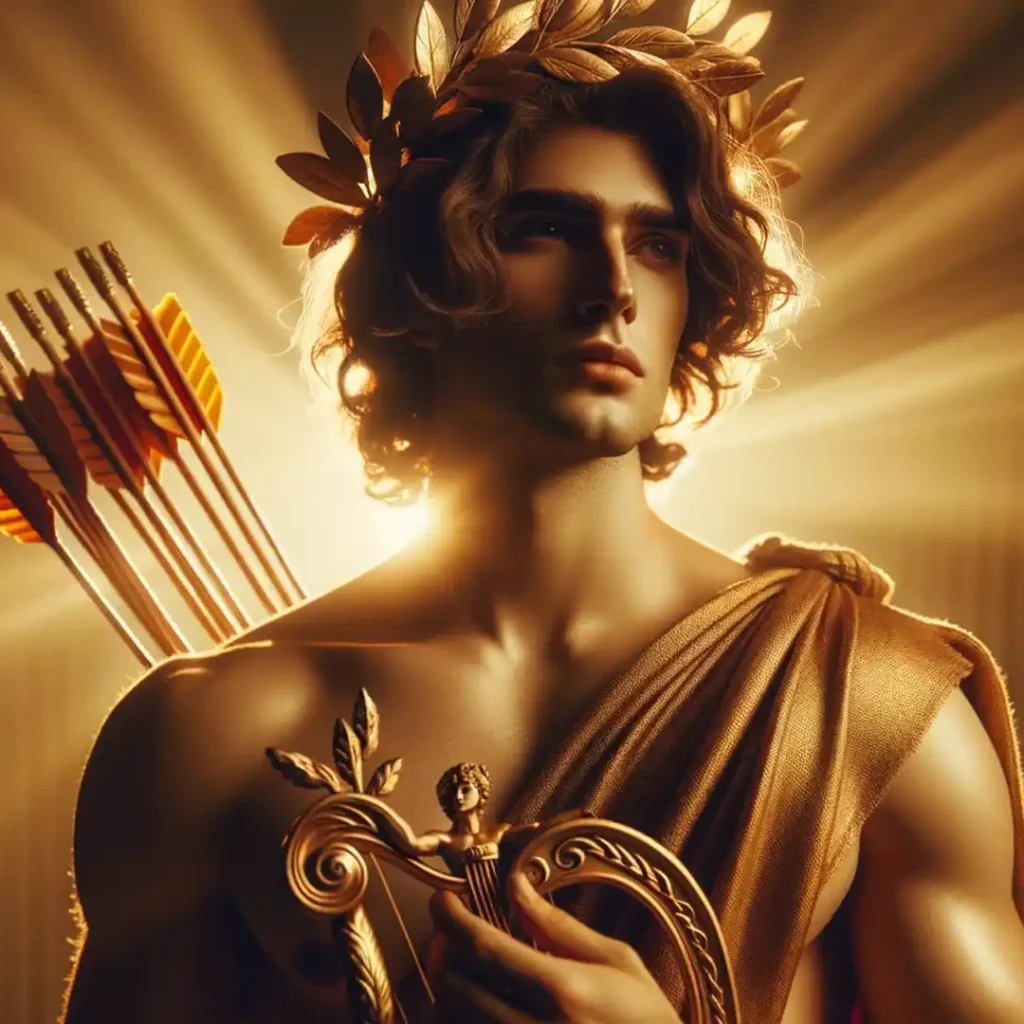
Apollo was the son of Zeus and Leto, twin brother of Artemis. He was the god of music, and he is often depicted playing a golden lyre. He was also known as the Archer, far shooting with a silver bow; the god of healing, giving the science of medicine to man; the god of light; and the god of truth.
One of Apollo’s most important daily tasks was to harness his four-horse chariot, in order to
move the Sun across the sky.
The Oracle in Delphi was devoted to Apollo. People from all over the known world travelled there to learn what the future held for them. His holy tree was the laurel, and his holy animal was the dolphin.
Artemis

Artemis was the goddess of chastity, the hunt, the moon, and the natural environment.
She was the daughter of Zeus and Leto, twin sister of Apollo. As soon as Artemis was born, she helped her mother give birth to her twin brother, thereby becoming the protector of childbirth and labor. She asked her father to grant her eternal chastity and virginity, and never gave in to any potential lovers; devoted to hunting and nature, she rejected marriage and love.
She was the protector of nature and the hunt; both wild and tame animals were under her protection. She also protected the agriculture and animal herding. Her symbols were weapons, stags, and the crescent moon.
Athena
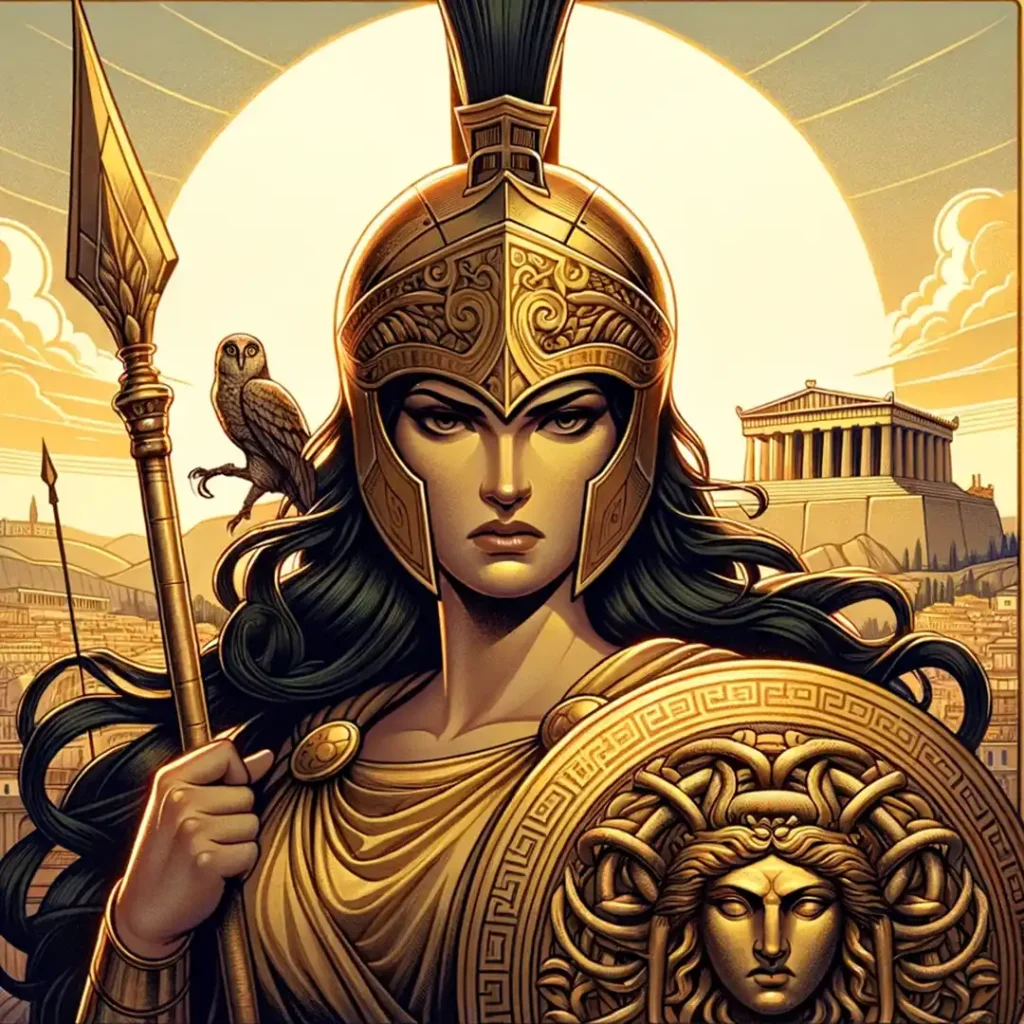
Athena was the Greek goddess of wisdom/reason, war, the arts and literature. She was the daughter of Zeus; her birth is unique in that she did not have a mother. Instead, she sprang full-grown and clad in armor from Zeus’ forehead.
She was fierce and brave in battle; however, she only took part in wars that defended the state and home from outside enemies. She invented the bridle, which permitted man to tame horses, the trumpet, the flute, the pot, the rake, the plow, the yoke, the ship, and the chariot.
She was Zeus’ favorite child and was allowed to use his weapons, including his thunderbolt. She became the patron saint of Athens, after winning a contest against Poseidon.
Her holy tree is the olive tree and she is often symbolized as an owl. Other symbols include two types of armor—the breastplate and a shield.
Demeter
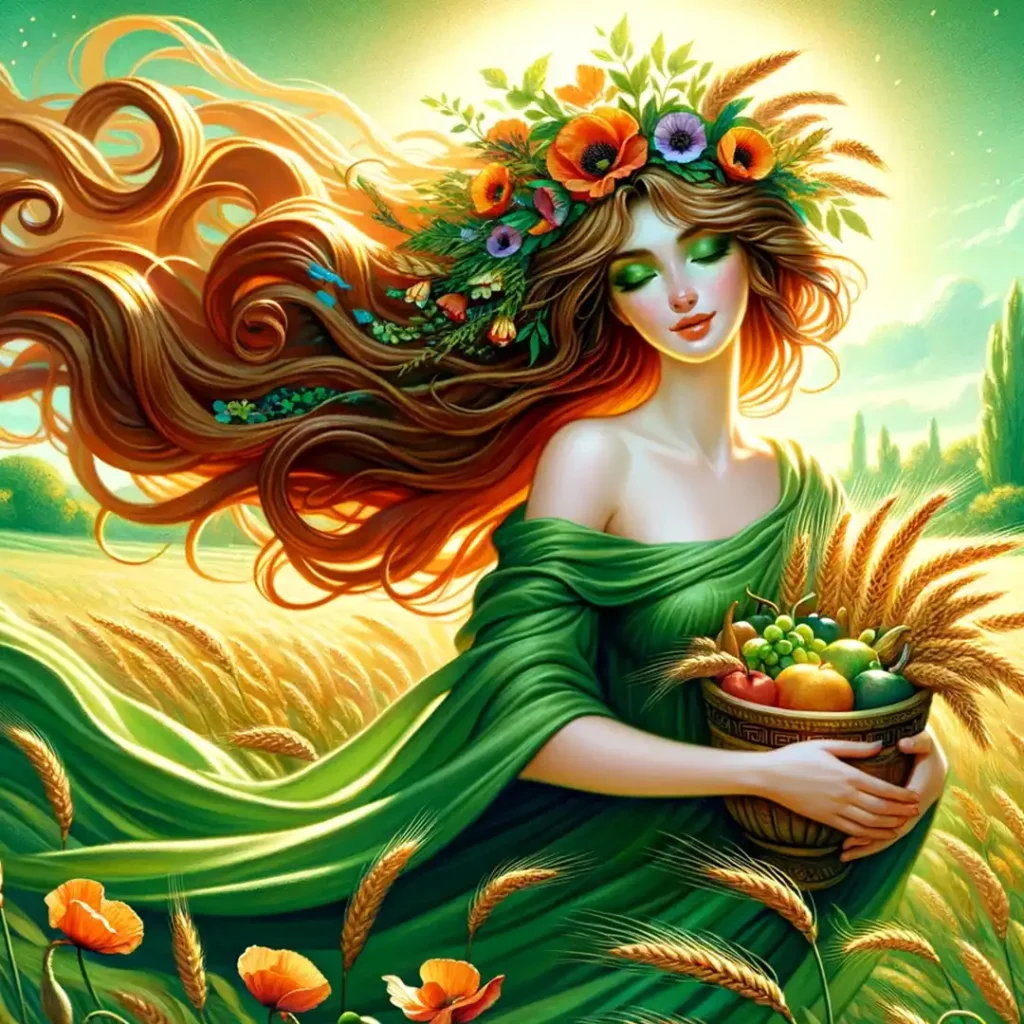
Demeter was the goddess of agriculture. She was the daughter of Cronus and Rhea. Sacred to her are livestock and agricultural products, wheat and the poppy.
Demeter was intimately associated with the seasons. Her daughter Persephone was abducted by Hades to be his wife in the underworld. In her anger at her daughter’s
loss, Demeter laid a curse on the world that caused plants to wither and die, and the land to become desolate. Zeus, alarmed for the barren earth, sought for Persephone’s return. However, because she had eaten while in the underworld, Hades had a claim on her. Therefore, it was decreed that Persephone would spend four months each year in the underworld to grieve for her daughter’s absence, withdrawing her gifts from the world and creating winter. Her return brought the spring.
Hephasteus

Hephaestus was the Greek god of fire, blacksmiths, sculptors, metallurgy, volcanoes; thus, he is symbolized with a hammer, an anvil and a pair of tongs.
According to Homer’s epics, the Iliad and the Odyssey, he was the son of Zeus and Hera. However, Hesiod informs us that Hera bore Hephaestus alone. According to an account, after Hephaestus was born, Hera threw him from Olympus because he was crippled; he fell into the ocean and was raised by Thetis and Eurynome. He was later accepted back to
Olympus, and became the craftsman of the gods, creating majestic armors, shields and weapons.
Hera
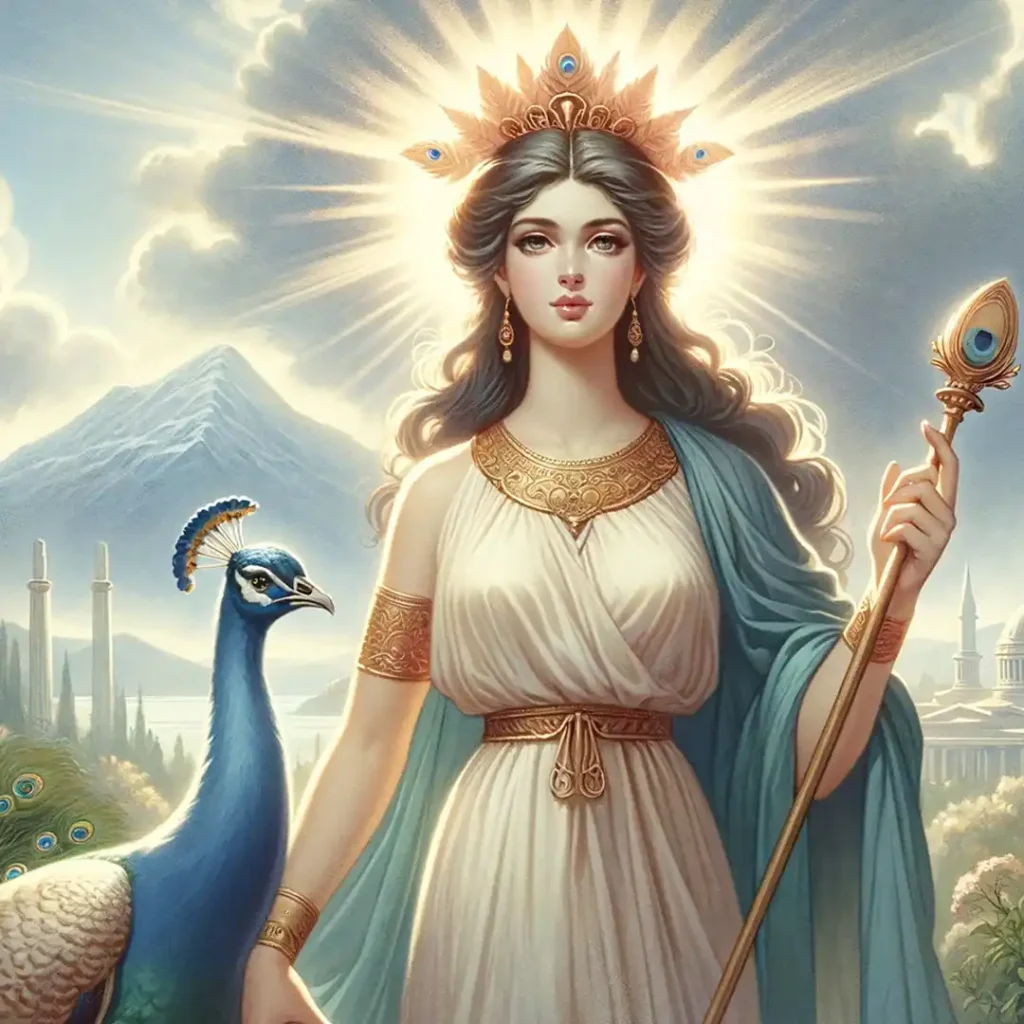
Hera was Zeus’ wife and sister, and was raised by the Titans Oceanus and Tethys. She was the supreme goddess, patron of marriage and childbirth, having a special interest in
protecting married women. Her sacred animals were the cow and the peacock, and she favored the city of Argos.
She often interfered with Zeus’s plans and she was often able to outwit him. Most stories concerning Hera deal with her jealousy and her plans of revenge for Zeus’s
infidelities.
Hermes
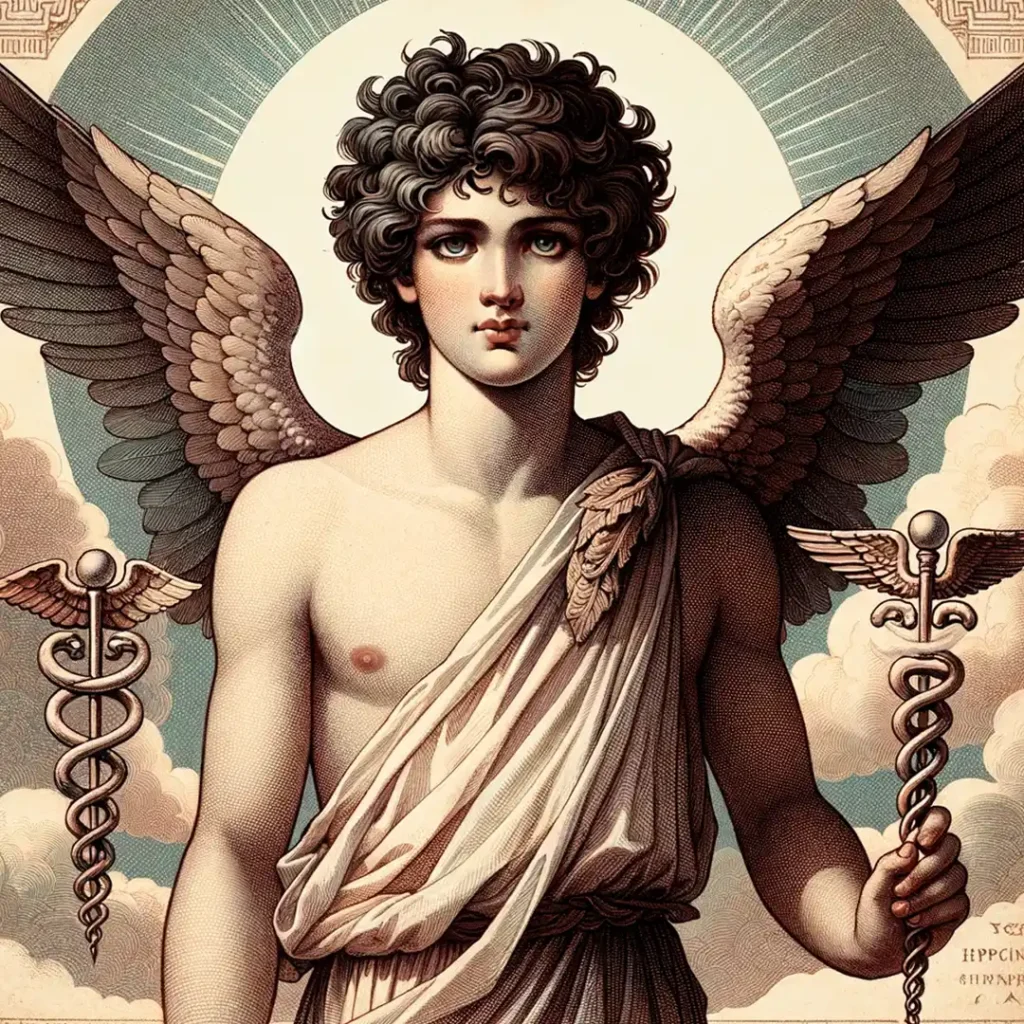
Hermes was the Greek messenger god, or the god of commerce, son of Zeus and Maia. Quick acting and cunning, he was able to move swiftly between the world of man and the world of gods, acting as a messenger of the gods and the link between mortals and the Olympians.
He was the protector of travelers, thieves and athletes. He occasionally tricked the other gods for his own amusement or in an effort to protect humans.
With the ability to move freely between worlds, he also served as the guide of the souls of the dead to the underworld and the afterlife. His symbols were a winged cap and sandals.
Dionysus

He was the god of fertility and wine, later considered a patron of the arts. He had a dual nature; on one hand, he brought joy and divine ecstasy, or he would bring brutal and blinding rage, thus reflecting the dual nature of wine.
Dionysus was also one of the very few characters able to bring a dead person back from the underworld.
The festival for Dionysus was held in the spring when vines would start bearing leaves. It became one of the most important events of the year, and its primary focal point was the theater. Most of the great Greek plays were initially written to be performed at the feast of Dionysus. All participants, writers, actors, and spectators, were regarded as sacred servants of Dionysus during the festival.
Poseidon
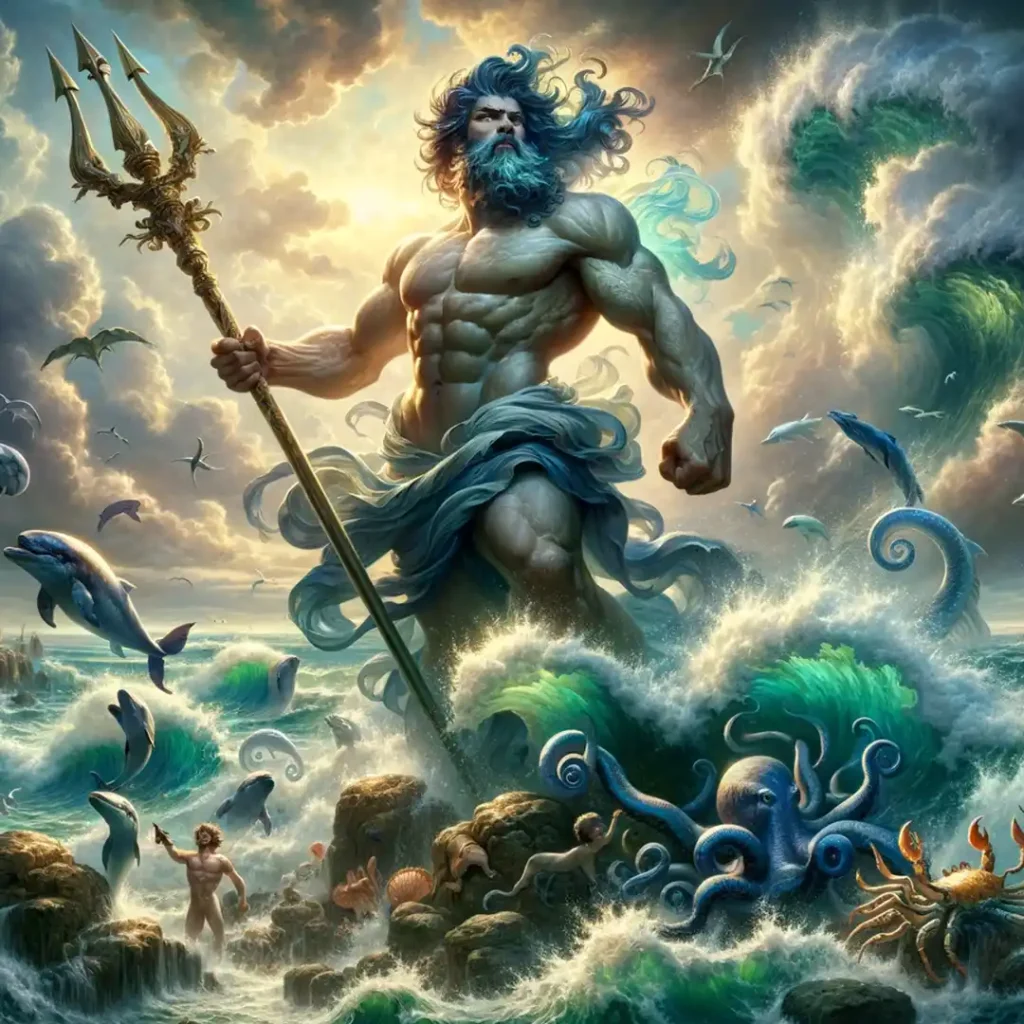
Poseidon is the god of the sea and protector of all aquatic features. Brother of Zeus and Hades, after the overthrow of their father, Cronus, he drew lots with them to share the universe. He ended up becoming lord of the sea. He was widely worshiped by seamen. He married Amphitrite, one of the granddaughters of Titan Oceanus.
His weapon was a trident, with which he could make the earth shake, causing earthquakes, and shatter any object. He was second to Zeus in power amongst the gods. He was
considered by Greeks to have a difficult quarrelsome personality. Combined with his greed,
he had a series of disputes with other gods during his various attempts to take over the cities they were patrons of. His symbols were the trident and dolphins.
Zeus
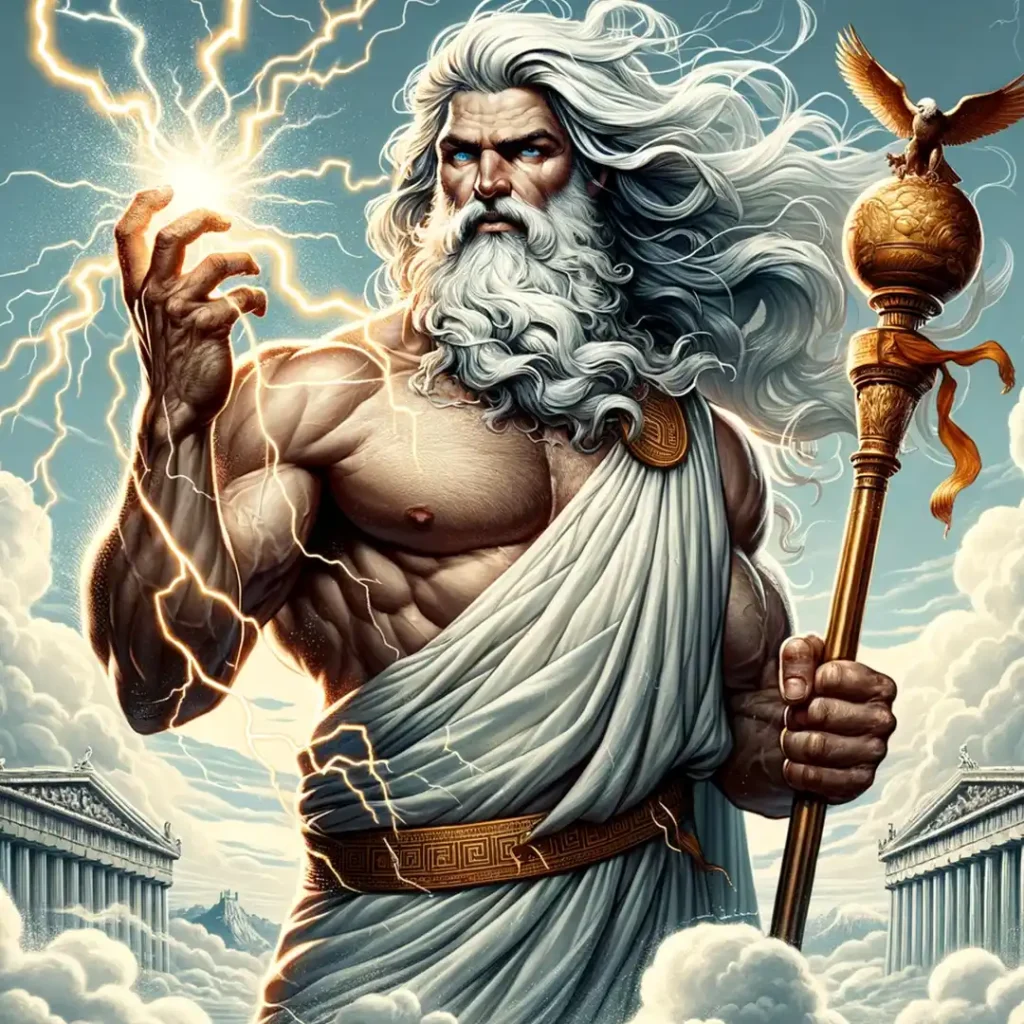
Zeus was the god of the sky and ruler of the Olympian gods. He overthrew his father, Cronus, and then drew lots with his brothers Poseidon and Hades, in order to decide who would succeed their father on the throne. Zeus won the draw and became the supreme ruler of the gods, as well as lord of the sky and rain. His weapon was a thunderbolt which he hurled at those who displeased or defied him, especially liars and oath-breakers. He was married to Hera but often tested her patience, as he was infamous for his many affairs.
Using his shield, the Aegis, Zeus could create all natural phenomena related to the air and the sky, such as storms, tempests, and intense darkness.
As the ruler of the state, he was the source of kingly power, the upholder of all institutions connected to the state, and the friend and patron of princes, whom he guarded and assisted with his advice and counsel. He was also the protector of the people, and watched over the welfare of the whole community.
Zeus continued – As the father of the gods, Zeus ascertained that each deity perform their individual duty, punished their misdeeds, settled their disputes, and acted towards them on all occasions as their all-knowing counselor and mighty friend.
As the father of men, he took a paternal interest in the actions and well-being of mortals. He watched over them with tender solicitude, rewarding truth, charity, and fairness, while severely punishing perjury and cruelty. Even the poorest and most forlorn wanderer
could find a powerful advocate in Zeus, for he, as a wise and merciful paternal figure, demanded that the wealthy inhabitants of the earth be attentive to the needs of their less fortunate fellow citizens.
Hestia
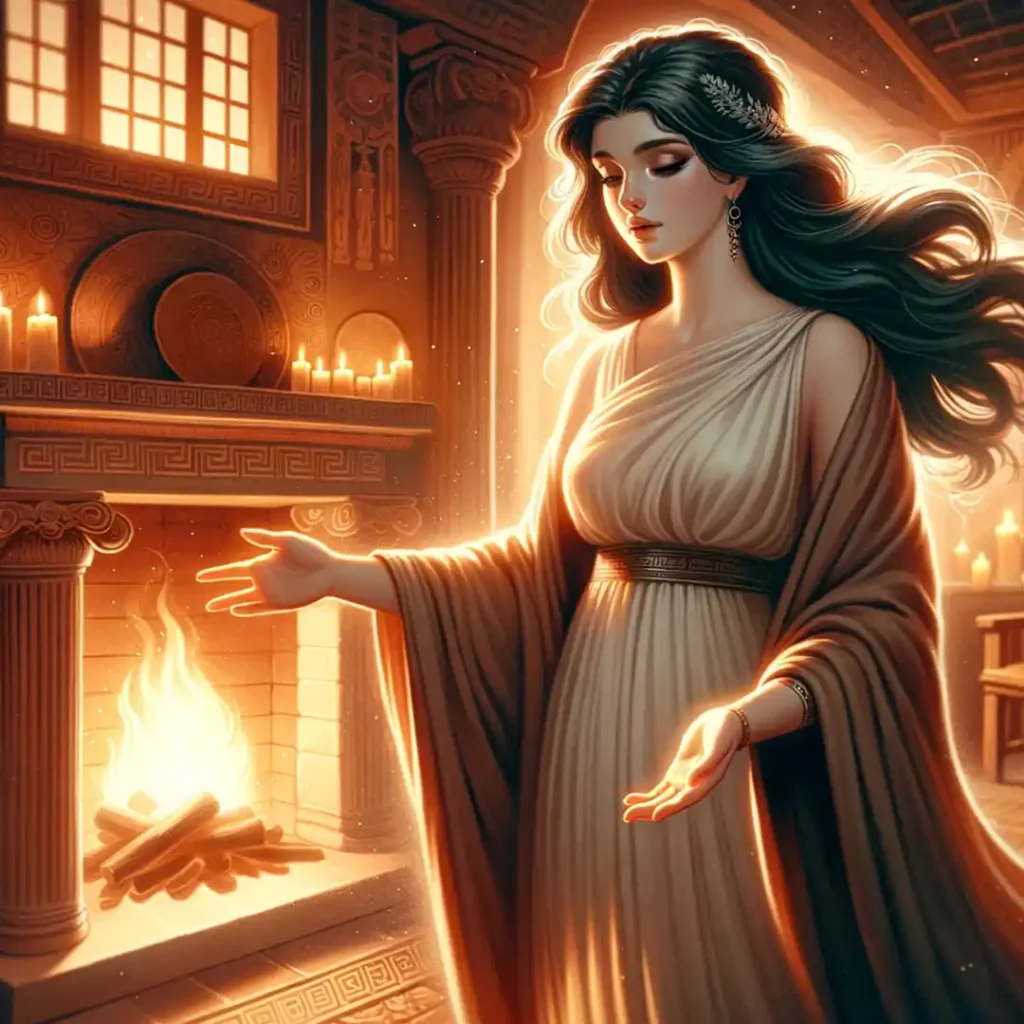
Hestia was the goddess of the hearth, family, and domestic life. Her name meant
both a house and a hearth, symbolizing the home and its residents. She also represented
the coalition and relationship between the colonies and the mother cities. She was Zeus’ sister, but although initially she was included in the Olympian gods, she was later replaced by Dionysus.
Hades
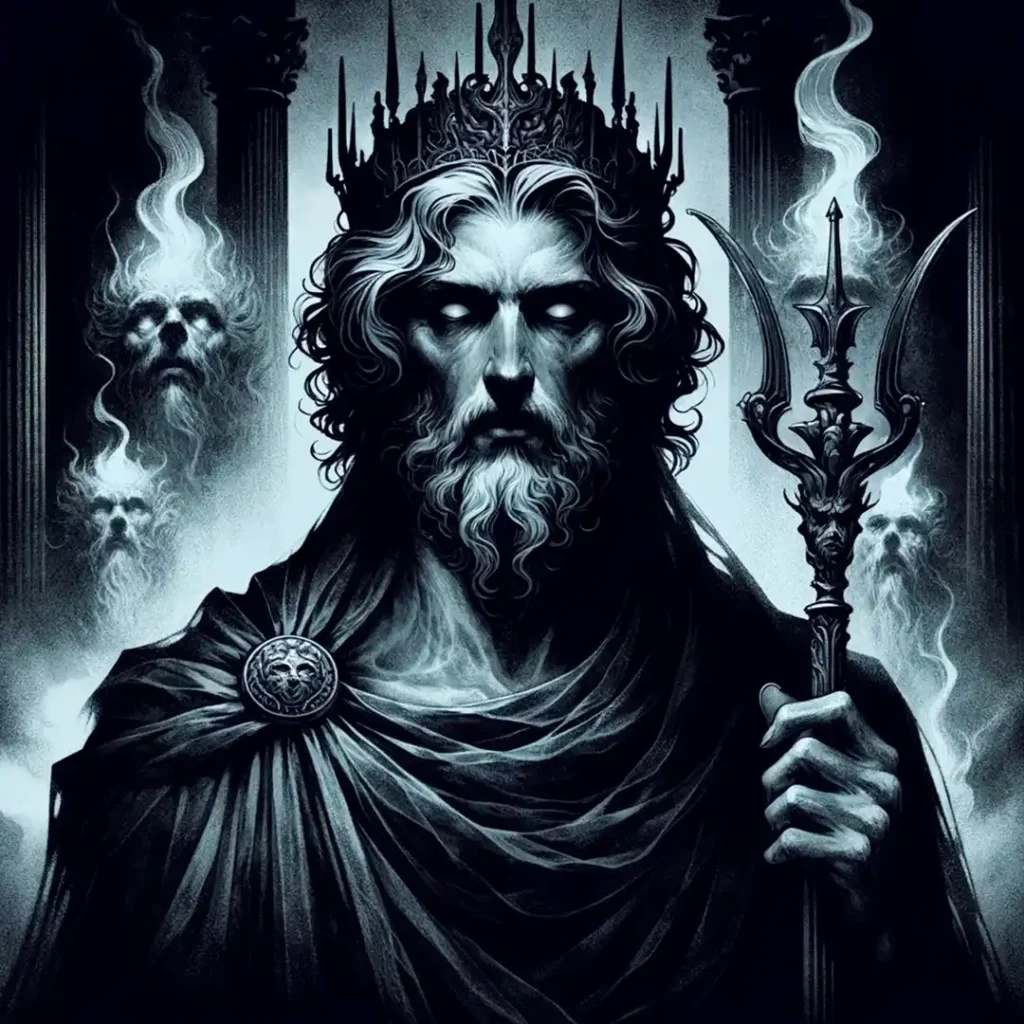
Hades was the brother of Zeus and Poseidon. After the overthrow of their father, Cronus, he drew lots with them to share the universe. He drew poorly, which resulted in becoming lord of the underworld and ruler of the dead. Greedy like his brother Poseidon, he
was mainly interested in increasing his subjects, and anyone whose deeds resulted in people dying was favored by him. The Erinnyes (the Furies) were welcomed guests in his kingdom.
The Greeks were not keen on uttering his name, afraid of causing some kind of reaction that would end up with them dead sooner.
Although the brother of Zeus, Hades, is not considered an Olympian, Hades preferred the Underworld and rarely left his kingdom. His weapon was a pitchfork, which he used to create earthquakes, similar to the way Poseidon used his trident. He also had a helmet of invisibility, which he had received as a gift from the Cyclopes, in order to use it during the clash of the Titans. He was married to Persephone, daughter of Demeter, whom Hades abducted and carried down to the Underworld.
True or False Greek Gods Quick Quiz!
True or False
Athena was born from Zeus and Hera, similar to Ares.
False
Athena was born from Zeus alone, springing from his head fully grown and armored.
True or False
Apollo was responsible for moving the Sun across the sky with his chariot.
True
In Greek mythology, one of Apollo’s tasks was to drive his chariot across the sky to move the Sun.
True or False
Ares was widely loved by other gods in Olympus for his peaceful nature.
False
Ares was actually one of the least favored gods among both deities and mortals due to his aggressive and warlike disposition.
True or False
Artemis was the twin sister of Apollo and was also associated with the sun.
False
Artemis was indeed the twin sister of Apollo but she was associated with the moon, while Apollo was associated with the sun.
True or False
Demeter’s curse upon the earth for her daughter’s abduction caused an eternal winter until Persephone was returned.
False
The curse caused the seasons to change, not an eternal winter; winter occurred annually when Persephone was in the underworld.
True or False
Hephaestus created weapons and armor for the gods in the forges of Mount Olympus.
True
Hephaestus was the craftsman of the gods, creating their weapons and armor.
True or False
Hera was known for her vengeful character, especially in matters concerning Zeus’s numerous affairs.
True
Hera was known for her jealous and vengeful nature towards Zeus’s infidelities.
True or False
Hermes was the only god able to travel freely between the mortal world and Olympus, as well as into the underworld.
False
While Hermes was known for moving between worlds, other gods, including Dionysus and Hades, could also traverse different realms.
True or False
Poseidon was considered the most temperate and level-headed of the Olympian gods.
False
Poseidon was known for his difficult, quarrelsome personality and his disputes with other gods.
True or False
Zeus was known for his fairness and punished deceit and perjury.
True
Zeus was indeed known for punishing those who lied or broke oaths.


